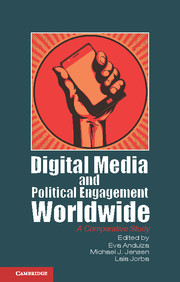Book contents
- Frontmatter
- Contents
- List of Tables and Figures
- Contributors
- Acknowledgments
- Introduction
- 1 The Impact of Digital Media on Citizenship from a Global Perspective
- 2 Recent Shifts in the Relationship between the Internet and Democratic Engagement in Britain and the United States
- 3 Political Engagement and the Internet in the 2008 U.S. Presidential Elections
- 4 Online Political Participation in the United States and Spain
- 5 Internet Use and Political Attitudes in Europe
- 6 Digital Media and Offline Political Participation in Spain
- 7 Online Participation in Italy
- 8 On the Causal Nature of the Relationship between Internet Access and Political Engagement
- 9 The Uses of Digital Media for Contentious Politics in Latin America
- 10 Opening Closed Regimes
- 11 Digital Media and Political Attitudes in China
- Conclusion
- References
- Index
5 - Internet Use and Political Attitudes in Europe
Published online by Cambridge University Press: 05 July 2012
- Frontmatter
- Contents
- List of Tables and Figures
- Contributors
- Acknowledgments
- Introduction
- 1 The Impact of Digital Media on Citizenship from a Global Perspective
- 2 Recent Shifts in the Relationship between the Internet and Democratic Engagement in Britain and the United States
- 3 Political Engagement and the Internet in the 2008 U.S. Presidential Elections
- 4 Online Political Participation in the United States and Spain
- 5 Internet Use and Political Attitudes in Europe
- 6 Digital Media and Offline Political Participation in Spain
- 7 Online Participation in Italy
- 8 On the Causal Nature of the Relationship between Internet Access and Political Engagement
- 9 The Uses of Digital Media for Contentious Politics in Latin America
- 10 Opening Closed Regimes
- 11 Digital Media and Political Attitudes in China
- Conclusion
- References
- Index
Summary
Introduction
Political attitudes are relevant for a variety of reasons. Interested and critical citizens can actively monitor their government's activities and thus foster accountability. People who think that they are able to influence government are more likely to participate in politics, vote in elections, and follow political news. Thus, the level of political interest or efficacy of a population is critical to the proper working of democratic countries. However, political attitudes vary widely cross-nationally and are undergoing profound changes in advanced industrial democracies (Dalton 2002, 2008; Pharr and Putnam 2000; Norris 1999b).
In this chapter we use different approaches to investigate the extent to which digital media contribute to shape some relevant political attitudes. First, we look at the impact of internet use on political attitudes from a large cross-national perspective. This is a novel contribution to the literature on digital politics. Because most of the core works in this field deal only with the United States or a limited range of other case studies, we lack a reliable comparative picture of the relationship between internet use and political attitudes. To do this, we use the European Social Survey and examine the link between internet use and political attitudes in fifteen European countries. Then, we consider in depth a particular case, Spain, analyzing both quantitative evidence (survey data from fall 2007) and qualitative data (from focus groups carried out in fall 2008).
- Type
- Chapter
- Information
- Digital Media and Political Engagement WorldwideA Comparative Study, pp. 102 - 117Publisher: Cambridge University PressPrint publication year: 2012
- 6
- Cited by



